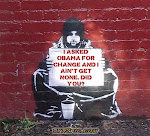"In July 2006, Fidel Castro handed control of the Cuban government over to his brother Raúl Castro. As the new head of state, Raúl Castro inherited a system of abusive laws and institutions, as well as responsibility for hundreds of political prisoners arrested during his brother’s rule. Rather than dismantle this repressive machinery, Raúl Castro has kept it firmly in place and fully active. Scores of political prisoners arrested under Fidel Castro continue to languish in Cuba’s prisons. And Raúl Castro’s government has used draconian laws and sham trials to incarcerate scores more who have dared to exercise their fundamental freedoms.
"Raúl Castro’s government has relied in particular on a provision of the Cuban Criminal Code that allows the state to imprison individuals before they have committed a crime, on the suspicion that they might commit an offense in the future. This 'dangerousness' provision is overtly political, defining as 'dangerous' any behavior that contradicts socialist norms. The most Orwellian of Cuba’s laws, it captures the essence of the Cuban government’s repressive mindset, which views anyone who acts out of step with the government as a potential threat and thus worthy of punishment.
"Despite significant obstacles to research, Human Rights Watch documented more than 40 cases in which Cuba has imprisoned individuals for 'dangerousness' under Raúl Castro because they tried to exercise their fundamental rights. We believe there are many more. The 'dangerous' activities in these cases have included handing out copies of the Universal Declaration of Human Rights, staging peaceful marches, writing news articles critical of the government, and attempting to organize independent unions.
"The Raúl Castro government has applied the 'dangerousness' law not only to dissenters and critics of the government, but to a broad range of people who choose not to cooperate with the state. We found that failing to attend pro-government rallies, not belonging to official party organizations, and being unemployed are all considered signs of 'antisocial' behavior, and may lead to 'official warnings' and even incarceration in Raúl Castro’s Cuba. In a January 2009 campaign called 'Operation Victory,' dozens of individuals in eastern Cuba—most of them youth—were charged with 'dangerousness' for being unemployed. So was a man from Sancti Spíritus who could not work because of health problems, and was sentenced to two years’ imprisonment in August 2008 for being unemployed.
"In addition to 'dangerousness,' Cuba has a wide range of other laws that criminalize the exercise of fundamental freedoms, including laws penalizing contempt, insubordination, and acts against the independence of the state. Indeed, article 62 of the Cuban constitution prohibits the exercise of any basic right that runs contrary to 'the ends of the socialist state.' Together with a judicial system that lacks independence and systematically violates due process rights, Raúl Castro’s government has employed such laws to imprison scores of peaceful dissidents.
"Imprisonment is only one of the many tactics the Cuban government uses to repress fundamental freedoms. Dissidents who try to express their views are often beaten, arbitrarily arrested, and subjected to public acts of repudiation. The government monitors, intimidates, and threatens those it perceives as its enemies. It isolates them from their friends and neighbors and discriminates against their families.
"Cuba attempts to justify this repression as a legitimate response to a US policy aimed at toppling the Castro government. It is true that the United States has a long history of intervention on the island, and its current policy explicitly aims to support a change in Cuba’s government. However, in the scores of cases Human Rights Watch examined for this report, this argument falls flat."
Friday, December 4, 2009
Subscribe to:
Post Comments (Atom)









No comments:
Post a Comment